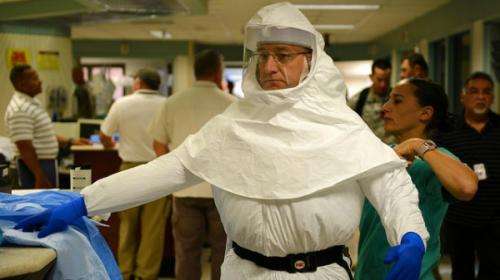Reporting on Ebola and how the media can learn from the past

This week Edith Cowan University's Trevor Cullen considers the media's role in spreading the word about diseases, with a focus on the threat posed by Ebola.
Research shows that the media plays a vital role when reporting on infectious diseases, whether it is HIV or Ebola, especially informing people with evidence-based facts.
This lessens fear and stigma and leads to a better understanding and response.
In the early 1980s, the media were slow to report on HIV until there was a heterosexual link.
When this happened, HIV was portrayed in the media as a serious threat to all sexually active people.
Up until then, the media framed and narrowcast the disease as predominantly a disease of gay people and drug addicts.
The media eventually corrected this distortion but it left a lasting impression and even today some people still believe this type of stereotyping.
While there have been 33 Ebola outbreaks since 1976 (and no outbreaks from 1979-1994), the 2014 outbreak in West Africa is definitely the largest.
Yet, the media were also slow to report consistently on Ebola until it came closer to home.
This was seen with the death of Thomas Duncan on 8 October.
He had arrived in Texas from Liberia to visit his family and his case showed that Ebola could spread in the US.
Coverage surged and this coincided with massive media interest in a Spanish nurse who was the first person to catch Ebola outside Africa.
Now Spain was at risk. Ebola was on Europe's doorstep and the media went into overdrive.
US and Europe outbreaks hit home
Initially, Ebola was seen as a third world disease but quickly became a first world disease when it hit the US and Europe.
Likewise, with HIV in the early 1980s, gay people and drugs addicts were outside mainstream interest and coverage.
From the media's perspective, geographical and cultural proximity play an important role in the selection of news stories, and it's understandable that the media focus on stories closer to home.
It would be interesting to imagine the type of coverage if Ebola was first detected in London.
This latest Ebola outbreak gives the media the opportunity to move beyond the purely biomedical approach to HIV reporting where a great deal of focus was on the disease and ways to treat it.
Eventually, the media did adopt a wider frame that explored the social, behavioral and cultural aspects of HIV. This approach provided a context and a much better way to contain it.
Trevor Cullen is an Associate Professor with Edith Cowan University's School of Communications and Arts. He will present his research finding on media coverage of HIV and Ebola at an International media conference in Auckland, New Zealand on 28 November.














